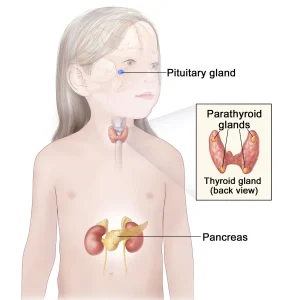Overview
Diagnosis
To diagnose multiple endocrine neoplasia, type 1 (MEN 1), your healthcare professional starts with a physical exam and asks about your personal and family health history. Blood tests and imaging studies are often part of the evaluation. Imaging tests may include:
• Magnetic resonance imaging (MRI) to create detailed images of organs and tissues
• Computerized tomography (CT) scan to generate detailed cross-sectional images of the body
• Positron emission tomography (PET) scan to visualize changes inside the body using low levels of radiation
• Nuclear medicine scans to help locate tumors using radioactive substances
• Endoscopic ultrasound of the pancreas and other organs to obtain images of the digestive tract and surrounding tissues
Genetic testing may help identify changes that cause MEN 1. Family members of someone with a confirmed genetic change may also be at risk. If no genetic changes are found in relatives, further screening may not be necessary. However, because not all genetic changes can be detected, follow-up care with blood tests and imaging may still be needed for suspected cases.
Treatment
Treatment for MEN 1 focuses on managing tumors on the parathyroid glands, pancreas, pituitary gland, and other areas. Treatment options depend on the type, size, and location of tumors.
• Pituitary tumors: Often treated with surgery or medication; radiation therapy is rarely used
• Hyperparathyroidism: Typically managed with surgery to remove most of the parathyroid glands
• Neuroendocrine tumors in the pancreas or small intestine: Treatment varies depending on tumor type and size
• Hypoglycemic syndrome from insulinomas: Often treated surgically; part of the pancreas may be removed
• Zollinger-Ellison syndrome: Managed with medications or surgery to remove gastrin-producing tumors
• Other pancreatic neuroendocrine tumors: Treated with medicine, surgery, or ablation to destroy abnormal tissue
• Metastatic neuroendocrine tumors: Surgery, liver-directed ablation, or chemoembolization; chemotherapy or hormone-based treatments may be used if surgery is not an option
• Adrenal tumors: Monitored with tests if inactive or small; surgically removed if hormone-producing or potentially cancerous
• Carcinoid tumors: Surgically removed if localized; chemotherapy, radiation, or hormone-based therapy may be used for advanced cases
Treatment plans are personalized to reduce symptoms, manage hormone imbalances, and prevent complications associated with MEN 1.
Advertisement

